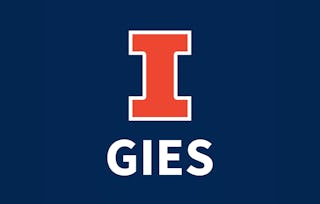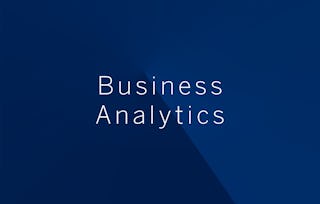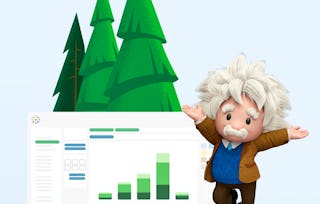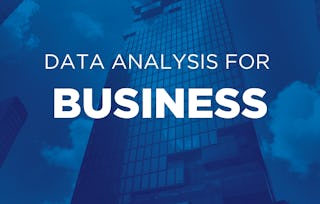This course will expose you to the data analytics practices executed in the business world. We will explore such key areas as the analytical process, how data is created, stored, accessed, and how the organization works with data and creates the environment in which analytics can flourish.

Introduction to Data Analytics for Business

Introduction to Data Analytics for Business
This course is part of Advanced Business Analytics Specialization

Instructor: David Torgerson
195,032 already enrolled
Included with
3,181 reviews
What you'll learn
Describe the information lifecycle from events in the real world to business actions
Recognize the types of events and characteristics that are often used in business analytics
Explain how the data is captured by source systems and stored using both traditional and emergent technologies
Gain familiarity with relational databases and learn how to use a simple but powerful language called SQL to extract analytical data sets of interest
Skills you'll gain
Details to know

Add to your LinkedIn profile
See how employees at top companies are mastering in-demand skills

Build your subject-matter expertise
- Learn new concepts from industry experts
- Gain a foundational understanding of a subject or tool
- Develop job-relevant skills with hands-on projects
- Earn a shareable career certificate

There are 4 modules in this course
Welcome to week 1! In this module we’ll learn how to think about analytical problems and examine the process by which data enables analysis & decision making. We’ll introduce a framework called the Information-Action Value chain which describes the path from events in the world to business action, and we’ll look at some of the source systems that are used to capture data. At the end of this course you will be able to: Explain the information lifecycle from events in the real world to business actions, and how to think about analytical problems in that context , Recognize the types of events and characteristics that are often used in business analytics, and explain how the data is captured by source systems and stored using both traditional and emergent technologies, Gain a high-level familiarity with relational databases and learn how to use a simple but powerful language called SQL to extract analytical data sets of interest, Appreciate the spectrum of roles involved in the data lifecycle, and gain exposure to the various ways that organizations structure analytical functions, Summarize some of the key ideas around data quality, data governance, and data privacy
What's included
9 videos4 readings1 assignment2 discussion prompts
In this module we’ll learn about the technologies that enable analytical work. We’ll examine data storage and databases, including the relational database. We’ll talk about Big Data and Cloud technologies and ideas like federation, virtualization, and in-memory computing. We’ll also walk through a landscape of some of the more common tool classes and learn how these tools support common analytical tasks.
What's included
7 videos3 readings1 assignment2 discussion prompts
In this module we’ll learn how to extract data from a relational database using Structured Query Language, or SQL. We’ll cover all the basic SQL commands and learn how to combine and stack data from different tables. We’ll also learn how to expand the power of our queries using operators and handle additional complexity using subqueries.
What's included
7 videos3 readings1 assignment1 discussion prompt
In this module we focus on the people and organizations that work with data and actually execute analytics. We’ll discuss who does what and see how organizational structures can influence efficiency and effectiveness. We’ll also look at the supporting rules & processes that help an analytical organization run smoothly, like Data Governance, Data Privacy, and Data Quality.
What's included
6 videos2 readings1 assignment1 peer review2 discussion prompts
Earn a career certificate
Add this credential to your LinkedIn profile, resume, or CV. Share it on social media and in your performance review.
Instructor

Offered by
Explore more from Data Analysis
 Status: Free Trial
Status: Free TrialUniversity of Illinois Urbana-Champaign
 Status: Preview
Status: PreviewCampus BBVA
 Status: Free Trial
Status: Free TrialTableau Learning Partner
 Status: Free Trial
Status: Free TrialFundação Instituto de Administração
Why people choose Coursera for their career

Felipe M.

Jennifer J.

Larry W.

Chaitanya A.
Learner reviews
- 5 stars
73.93%
- 4 stars
21.04%
- 3 stars
3.20%
- 2 stars
0.72%
- 1 star
1.09%
Showing 3 of 3181
Reviewed on Mar 25, 2021
Good layout, clear, good to access materials and videos. One peer reviews, I found one peer that clearly and blatantly copied the class material. There were no grading options to report this.
Reviewed on Nov 22, 2020
Overall I liked it. I would like to see more SQL practice and maybe a built-in tool to write SQL that shows where errors can be shown along with suggestions on how to fix the errors.
Reviewed on Aug 11, 2020
Very Informative and helpful in the domain of Data Analytics.The course structure is well planned and the overall course helped me a lot in gaining knowledge in the area of analytics.

Open new doors with Coursera Plus
Unlimited access to 10,000+ world-class courses, hands-on projects, and job-ready certificate programs - all included in your subscription
Advance your career with an online degree
Earn a degree from world-class universities - 100% online
Join over 3,400 global companies that choose Coursera for Business
Upskill your employees to excel in the digital economy
Frequently asked questions
To access the course materials, assignments and to earn a Certificate, you will need to purchase the Certificate experience when you enroll in a course. You can try a Free Trial instead, or apply for Financial Aid. The course may offer 'Full Course, No Certificate' instead. This option lets you see all course materials, submit required assessments, and get a final grade. This also means that you will not be able to purchase a Certificate experience.
When you enroll in the course, you get access to all of the courses in the Specialization, and you earn a certificate when you complete the work. Your electronic Certificate will be added to your Accomplishments page - from there, you can print your Certificate or add it to your LinkedIn profile.
Yes. In select learning programs, you can apply for financial aid or a scholarship if you can’t afford the enrollment fee. If fin aid or scholarship is available for your learning program selection, you’ll find a link to apply on the description page.
More questions
Financial aid available,
¹ Some assignments in this course are AI-graded. For these assignments, your data will be used in accordance with Coursera's Privacy Notice.

